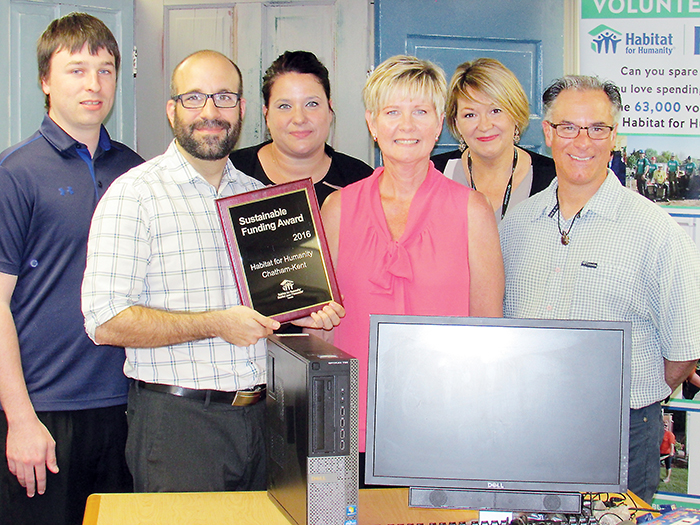
A home computer is something most of us take for granted, but for some families in need, it is a luxury they can’t afford.
Thanks to a unique partnership between the Municipality of Chatham-Kent and Habitat for Humanity Chatham-Kent (HFHC-K), area families are being provided with used computers at no cost. This program has earned the local group a national award.
HFHC-K recently received a national Sustainable Funding Award at a conference in British Columbia for its efforts in providing used computers to low-income families, according to executive director Nancy McDowell. Due to the success of the Chatham-Kent program, she said the national Habitat for Humanity organization is looking to start similar partnerships across the country.
During the last year, HFHC-K has distributed 80 computers on a referral basis primarily with Ontario Works, and has signed an agreement to continue the service for the next two years, McDowell said.
Once computers have run their lifecycle at the municipality, they are wiped of information and given to the IT committee at Habitat to re-purpose.
She added the computers can be a life-changing event for those who receive them.
“Our staff has been hugged and thanked by people receiving the computers,” she said. “A lack of income can be isolating. Often job applications have to be filled in online, or students’ homework requires online work. For a family that can’t afford a computer, this presents real challenges.”
Due to the constant use of municipal computers, it was found that those over four years old required costly maintenance, so a lifecycle replacement program was instituted through the Information Technology Services Department.
The program is overseen by the municipality’s CKESS (Chatham-Kent Employment and Social Services) department.
Polly Smith, program manager of employment and social services for the municipality, said Habitat for Humanity is an excellent partner for the initiative since it has the ability to determine eligibility of recipients.
She noted that although the partnership with Habitat is only a year old, the municipality has been working with various organizations since 2003.
“We have distributed about 1,000 computers over the years,” she said.
Smith pointed out that the United Nations declared access to the Internet a human right in a 2011 report.
“Access to the Internet allows for the free flow of information, low cost or free education opportunities, and online job searching. Increasingly, for people with transportation barriers (often of lower incomes), it also allows them to access many services they need online. Human Resources and Skills Development Canada cites computer use as one of the nine ‘essential skills’ for workers today,” she said.
Internet use numbers from Statistics Canada shows a digital divide between higher income and lower income households. Only 62% of Canadian households with an income under $30,000 use the Internet.
“Having a computer has allowed low income families use for school work, job searching, social inclusion activities and to find needed information on services or apply for things online, alleviating transportation barriers,” she said. “Reusing the computers means less waste going into landfills, so it’s a win for everyone.”
Richard Drouillard, Habitat board chair and IT committee volunteer, said they have the privilege of seeing the impact of the program.
One example he gave was of a women referred from social services who had the opportunity for a job that day if she had a home computer. Drouillard went to Habitat on his lunch break, got the computer set up and was able to give it to her that day.
“I gave her the box and she was in tears. It changed her life,” Drouillard explained. “She mentioned all she needed was a head set to talk to customers, and I remembered seeing one in one of boxes so I was able to give her that as well.”
The success of the local program, according to McDowell, has the board looking at other partners to bring into the program in the future, such as large employers like Union Gas or St. Clair College.






